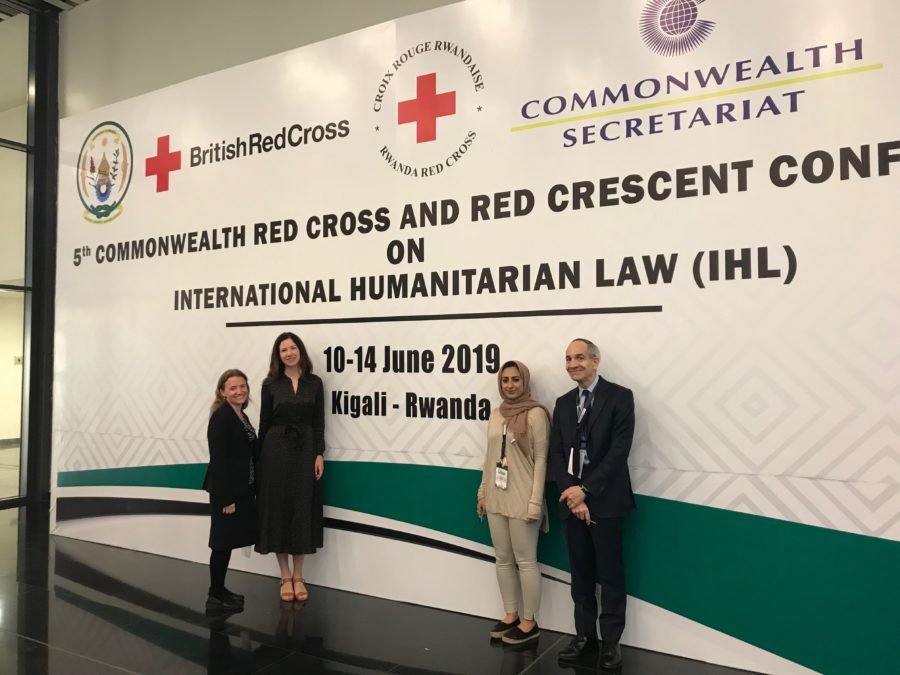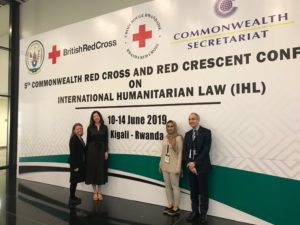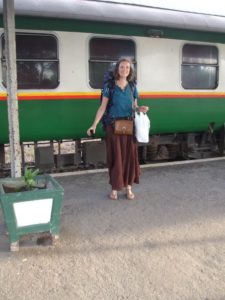23rd July 2019 Geneva, Switzerland
International Law and the Commonwealth

Last month I squeezed in a visit to Kigali in Rwanda for the 5th Commonwealth Red Cross and Red Crescent Conference on International Humanitarian Law (IHL). I was there to speak on two panels, about the UK’s recent report on implementation of IHL and about our forthcoming global summit on preventing sexual violence in conflict.

The UK delegation at the Kigali Conference (June 2019)
I first visited East Africa in 2009, to volunteer with a Kenyan NGO that drives forward programmes of social change in the rural communities from which its founders come. Back then, I stayed with a host family in Mnarani, a hot 30-minute walk from Kilifi, the nearest town with tarmacked roads and electrified homes. My abiding memories are of bathing in the creek, buying mangoes from sun-warmed roadside stacks, learning how to hand-wash my clothes with a stone and a big tub of Toss, and hoovering up all the kachumbari and maharage ya nazi I could find.
Afterwards, I took the train from Mombasa to Nairobi, on a line built by the British in 1896, and in a carriage seemingly unchanged since Kenyan independence. It was one of the many reminders of the complex relationship between my country and theirs. Having turned up as a starry-eyed volunteer, I couldn’t shake the feeling that any interference by a well-meaning law student wasn’t what my local friends really wanted, or needed.

Strangely excited to be getting on a train (July 2009)
My week in the Rwandan capital could not have been more different. Delegates from the various governments, parliaments, judiciaries and national Red Cross and Red Crescent societies came together on an equal footing to exchange views on the protection of civilians during armed conflict, the regulation of weapons, and the urgent need to prepare for climate-related emergencies. All in a city with smooth roads, quiet pavements (pavements!), a world-class conference centre and a vibrant contemporary art scene.
It was hard to believe the genocide that decimated parts of the country’s population took place only 25 years ago. Many of the conference delegates were staying at the Hotel Mille Collines, the sanctuary for many Tutsis which was memorialised in the film Hotel Rwanda, these days restored to four-star glory, with a live band covering pop hits in the bar most nights.
That being said, on the penultimate day of the conference, the ICRC organised a visit for delegates to the Kigali Genocide Memorial. It was profoundly moving: the facts and figures I had learned in law school made visceral by photographs, footage and first-hand testimony.
In the Memorial’s museum, we read that the essentially class-based but traditionally fluid distinction between Hutus and Tutsis was entrenched by the Belgian administration, which forced the people of what was then Ruanda-Urundi to carry ethnic identity cards and precluded anyone not Tutsi from undertaking higher education.
The continuing legacy of colonialism that first hit my radar during my time in Kenya continues to shape my awareness of the baggage that comes with being a Brit in the multilateral system. It is impossible to imagine the world today without the impact of “Empire”.
One of the ways in which we can use these bonds as a force for good is through the Commonwealth. These 53 states are united by a commitment to democracy, human rights and the rule of law. We share a common law understanding of the way that legal norms can and should evolve and adapt to meet contemporary needs. And though we do not coordinate those laws, nor our positions when negotiating internationally, we do – at forums like the Kigali IHL conference – exchange best practice, enjoy thematic discussions, and (where requested and possible) build national capacities.
My own highlight of the conference was the powerful testimony of the Hon Millie Grace Akoth Odhiambo about the reforms to sexual offences legislation which she sponsored through the Kenyan parliament in the wake of increased incidence during electoral violence in 2007. To take national ownership for prevention, these laws now ensure that men and boys, as well as women and girls, are protected; that the broadest possible spectrum of sexual violence is prohibited; and that comprehensive witness protection measures are available to all survivors. There is much we can learn from one another.